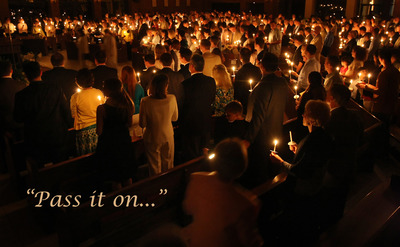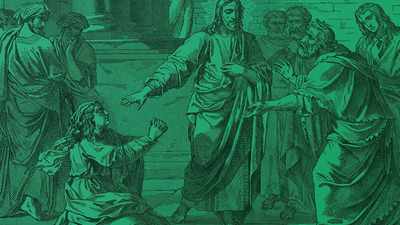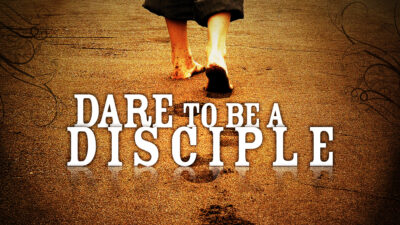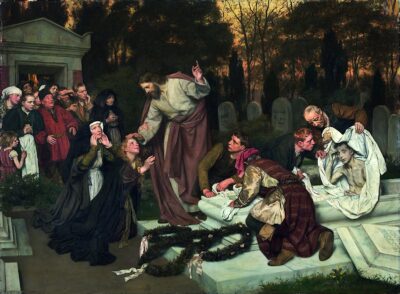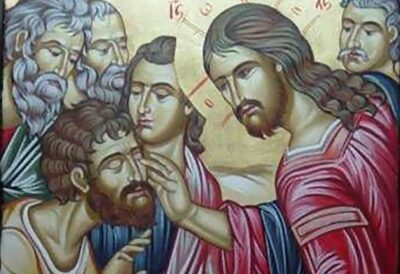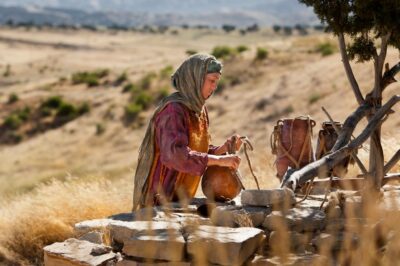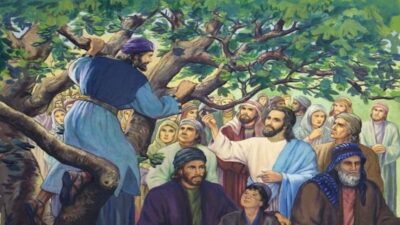May 28, 2023
|by N W
|
0 Comments
|
Blessings, Deacon Mark, Healing, Holy Spirit, Pentecost, Sacraments
Pentecost Sunday
May 28, 2023 — Year A
Readings: Acts 2:1-11 / Ps 104 / 1 Cor 12:3b-7, 12-13 / Jn 20:19-23
by Rev. Mr. Mark De La Hunt, Permanent Deacon
Here is a true story that illustrates the need to intentionally invite the Holy Spirit into your life and to intentionally surrender control to Him when He needs to use you to help someone else.
A good Catholic man, who knew the scriptures and his Catholic faith, shared a story of praying outside an abortion clinic. He spoke to a woman who was headed in, but despite his faith and his spiritual learning, he couldn’t speak anything of meaning to her, and she proceeded to the door of the clinic and grabbed the door handle. The man tossed up a five-second prayer, “I’m so sorry Lord. I don’t know what to say. Help me, Holy Spirit!” Suddenly he spoke the most eloquent words to her; no, he blurted out two words, “hair bows!”
The woman stopped, let go of the door handle and walked back toward him, tears in her eyes. She asked, “What did you just say?” He said, “Hair bows. I just thought you would enjoy putting bows in the baby’s hair if it is a girl.” Turns out the woman had a strong memory of her mom and hair bows, strong enough to penetrate the darkness and despair she was in and to displace it with Christ’s light and truth. Those two little words awakened in her a love for her unborn child and for motherhood. The Holy Spirit came through in a surprising way. You might even say the Spirit enabled the man to speak in tongues, for the words he spoke were understood by that woman in a way that saved her soul and her baby’s life. That’s how the Holy Spirit rolls!
Happy Pentecost everyone. Today we celebrate the fulfillment of the Father’s promise to baptize us with the Holy Spirit (Acts 1). Pentecost in Greek means “fiftieth.” The Jews celebrated Pentecost fifty days after Passover, which is a celebration of deliverance from bondage in Egypt and of God coming down upon Mount Sinai in fire, shaking the mountain. This prefigured the new Pentecost, which we celebrate every year, fifty days after the new Passover, which we now call Easter (Pitre).
You may have picked up on how the Christian Pentecost is similar to the Jewish one in its remembrance of that day at Mount Sinai. Listen again. “And suddenly from heaven there came a sound like the rush of a violent wind, and it filled the entire house where they were sitting.” But in the new Pentecost something dramatically different, something astounding happens that did not happen at Mount Sinai. Fire came down, yes, but “Divided tongues, as of fire, appeared among them, and a tongue rested on each of them. All of them were filled with the Holy Spirit (Acts 2:2-4).”
In this homily I hope to expand your awareness of the Holy Spirit and of His supernatural gifts that may be untapped in your life. I also hope to help you make your family life, school life, work life, prayer life, and sacramental life more intentionally focused on the Holy Spirit as that is what is best for you, your loved ones, the Church, and the world.
Before ascending into heaven, Jesus promised to send the Holy Spirit to “teach [us] everything and remind [us] of all that [He] told us.” (Jn 14:26). Jesus also said, “I have come to set the earth on fire, and how I wish that it were already blazing (Lk 12:49).” Fire, like in the tongues of fire, refers to the Holy Spirit. What does fire do? It transfigures that which is burning into itself. In our case, the Holy Spirit restores our divine nature, makes us holy, and equips us with supernatural gifts. Why? The Psalmist wrote the answer, so that “you [can] renew the face of the earth (Ps 104:30).”
What supernatural gifts does the Holy Spirit equip us with? Sanctifying gifts and Charismatic gifts. The seven sanctifying gifts are listed in Isaiah 11:1-3 and are: wisdom, understanding, counsel, fortitude, knowledge, piety, and fear of the Lord. Catholic theologian Mary Healy points out that Isaiah was describing the Messiah upon whom the Spirit would rest. Therefore, we receive the seven sanctifying gifts through baptism and confirmation, since we receive the Holy Spirit in those sacraments, and He forms us in the character of Christ (CCC 1831 / Healy 29-30).
What are Charismatic gifts? They are supernatural gifts meant for the service of others (1 Cor 12:1-7 / Healy 24). Again, drawing from Dr. Healy, the term charismatic comes from the Greek word charisma, which is based on the word for grace, charis. Therefore, a charism is a “tangible expression of God’s grace in a person’s life (Healy 24).” Every one of us was created by God with a specific role to play in building up the Church. The way God qualifies us to fulfill our unique role is with these many graces called charisms (CCC 798).
In Romans 13, St. Paul lists charisms for the building up of the Church, “serving, teaching, encouraging, contributing to the needs of others, leadership, and showing mercy.” And in a slight twist, St. Paul lists roles in the Church that the Holy Spirit anoints people for. They include apostles, prophets, evangelists, pastors, and teachers (Eph 4:8-11/ Healy 28). The Holy Spirit even desires to supernaturally enhance or elevate our natural gifts or aptitudes such as music, art, crafts, teaching, administration, etc., making them more efficacious than we can do on our own (Healy 24). Ask the Holy Spirit to reveal your gifts and to help you grow them and to put them at the service of the Church.
The longest single list of charismatic gifts is in 1 Cor 12. They are word of wisdom, word of knowledge, faith, healings, miracles, prophecy, discernment of spirits, tongues and interpretation of tongues. To learn more about these gifts, I recommend reading Dr. Healy’s book, “The Spiritual Gifts Handbook – Using Your Gifts to Build up the Kingdom of God.”
How is living life in the Holy Spirit best for you? Dr. Scott Hahn and Fr. Dave Pivonka both answered that question with the same metaphor. Living your life in the Spirit is like sailing, where the wind does most of the work. When you live in the Spirit, you may have a sense that you are moving through life’s challenges with less resistance. But like the wind, with the Holy Spirit, you never know for certain what He will do or where He will take you, and you have to wait for Him. Bishop Barron echoes this in his reflection on the third Glorious Mystery. He says we don’t make the Holy Spirit show up. We call and we wait like the disciples and Mary were waiting in the upper room when He came.
What characteristics will a person have who does so? St. Paul listed them as love, joy, peace, patience, kindness, goodness, faithfulness, gentleness, and self-control (Gal 5:22-23). That is a great list to take to prayer and to use as an examination of the soul. It can help us see where we need to grow more like Christ by intentionally inviting the Holy Spirit into our life and following His promptings, even if they seem silly like, “blurting out hair bows” in a desperate situation.
We are blessed to be Catholic, for we experience the Holy Spirit’s power in the sacraments. We are baptized in water and the Holy Spirit, who made us His temple. In Confession, your sins are forgiven by the power of the Holy Spirit working through the priest who, in the prayer of absolution, says that “God the Father of Mercies sent the Holy Spirit into the world for the forgiveness of sins.” Today’s gospel, by the way, is the strongest biblical proof that Jesus gave His priests His power to forgive sins.
In the prayers during Anointing of the Sick the priest calls on the Holy Spirit as the consoler.” In the Eucharistic Prayer we hear Father pray, “Make holy, therefore, these gifts, we pray, by sending down your Spirit upon them as a dewfall.” You can’t miss it. The Deacon kneels as Father prays those words, and the altar server rings the bells. Finally, in Confirmation and Holy Orders the bishop lays his hands on the faithful’s head, imparting the Holy Spirit.
Despite all the ways we receive the Holy Spirit, you are not alone if you struggle with identifying with Him. Theologian Sr. Elizabeth Johnson summarized this well, writing, “While the Son has appeared in human form and while we can at least make a mental image of the Father, the Spirit is not graphic and remains theologically the most mysterious of the three divine persons.” (DANIEL P. HORAN OFM in National Catholic Reporter, January 12, 2023). That is one of the reasons God gives us signs.
Healings are one of those signs He gives us to make the Holy Spirit’s presence and power manifest. Some of you may remember former Holy Name of Mary parish Deacon, Ray Roderique, the father of several of Holy Name’s parishioners. He and his wife, Kathy, were very active in the Catholic Charismatic Renewal movement. Deacon Ray was particularly known for the gift of healing. Our former priest, Fr. Steve McNally, shared that, while on a trip with Deacon Ray, he was having a good bit of pain from a kidney stone. Ray prayed over him, and he was cured. I reached out to a couple of Ray’s adult children for their thoughts on the Holy Spirit.
His son, parishioner Paul Roderique, shared Sr. Johnson’s quote. One of his sisters, former parishioner, Colleen Crist, had this to say:
“The Holy Spirit is the single most important relationship a person can have if they desire to be as close to Jesus as possible! The Holy Spirit transforms, elevates, and increases every aspect of a person’s prayer life (“hair bows”). The Holy Spirit takes the fear out of it. He helps you realize that it’s not about you, but rather you are a team, and He’s doing the heavy lifting (Remember the wind moves the boat easier than our paddling). He gives you the courage, and the ability, and the wisdom, and the words to do the praying. We are simply allowing Him to use us. All it takes is being open, trusting, and malleable. When we open our hearts to the Holy Spirit and extend the invitation sincerely, then He can get to work. He will never force himself on us. To receive Him, simply extend the invitation. Invite the Holy Spirit in and ask Him to transform your life. Ask Him to teach you how to pray.”
Let’s do that right now and close with a favorite prayer of Colleen’s, an invitation to the Holy Spirit from St Augustine. Imagine yourself as that sailboat on the lake. Ready the sails, which are your faith. Take a deep breath and blow it out slowly and let’s see where the Father’s Holy Breath takes us. “Breathe in me, O Holy Spirit, that my thoughts may all be holy. Act in me, O Holy Spirit, that my work too may be holy. Draw my heart, O Holy Spirit, that I may love but what is holy. Strengthen me, O Holy Spirit, to defend all that is holy. Guard me then, O Holy Spirit, that I may always be holy.” Amen.
Citations
Mary Healy & Randy Clark. The Spiritual Gifts Handbook – Using Your Gifts to Build the Kingdom of God. Chosen Books 2018.
Bishop Barron. The Glorious Mysteries of the Rosary. Hallow app.
KEEP READING
 540-586-8988
540-586-8988 

